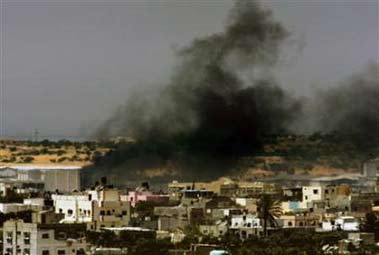
Black smoke is seen during an Israeli
bombardment over the town of Beit Lahiya, northern Gaza Strip July 8,
2006. UN chief Kofi Annan called for an immediate stop to what he called
Israel's 'disproportionate use of force' in Gaza but also pressed for the
release of an Israeli soldier snatched by Palestinian
militants.[Reuters] |
Israel launched rapid-fire air strikes against Palestinian militants across
the Gaza Strip on Sunday after rebuffing a proposed ceasefire by Prime Minister
Ismail Haniyeh of Hamas.
Israel is threatening to expand its offensive unless militants release
Corporal Gilad Shalit, an Israeli soldier abducted in a cross-border raid on
June 25, and halt rocket fire on Israeli cities.
At least three militants were injured in an early morning air strike near the
Karni commercial crossing, Palestinian medics and police said.
Israel also bombed a key bridge in northern Gaza, despite an appeal from the
United Nations to stop targeting the strip's fragile infrastructure.
The army said the goal was to prevent militants from transporting rockets to
launch sites.
In southern Gaza, Israel bombed a militant training camp. No one was hurt.
"It was being used to direct attacks," an army spokesman said.
Israel killed seven Palestinians, including a 6-year-old girl and a
policeman, on Saturday, Palestinian witnesses said.
About 50 Palestinians -- and one Israeli soldier -- have been killed so far
in the offensive, launched on June 28 to pile pressure on the Hamas-led
Palestinian government, already on the brink of financial collapse from a
Western aid embargo.
Israeli tanks withdrew from much of the northern Gaza Strip on Saturday but
soldiers remain in the southern part of the territory and have deployed close to
the outskirts of Gaza City.
"We will soon begin operations in other places," Israeli Military Southern
Command Chief Yoav Galant told Israeli media. "I see no reason to stop the
offensive as long as they are holding our soldier."
Galant said the Israeli offensive, criticized by the European Union and
United Nations, had no time limit and that troops were prepared to continue it
for "a month, two months and more if needed."
UN Secretary-General Kofi Annan called both sides to exercise restraint and
respect their obligations under international law.
"As I have repeatedly stated, I am extremely concerned about the dangerous
situation in the occupied Palestinian Territory. I am appealing for urgent
action to alleviate the desperate humanitarian situation of the civilian
population," Annan said.
"The Israeli air strikes on Gaza's only power plant have had a far-reaching
impact on Gaza's hospitals, flour mills, water and sanitation systems," he said.
Haniyeh said Israel's withdrawal from the Gaza Strip and a halt to military
actions could "make it easy for us to end the crisis" over Shalit.
Israel said it would only pull its troops out if militants halted rocket
attacks and released the soldier.
The Islamist Hamas and other militant groups have demanded Israel make the
first move by releasing hundreds of Palestinian prisoners in exchange for the
soldier. The Jewish state has rejected this.
"Our intentions are to bring security for Israel citizens and to release
Gilad," Galant said. "If someone expects us to play into the hands of the
Palestinians, they are mistaken."